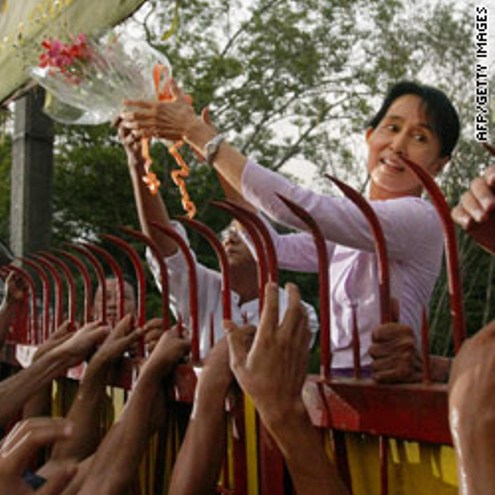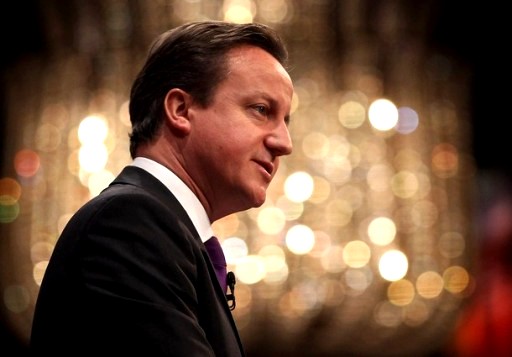
- Myanmar's pro-democracy leader Aung San Suu Kyi talks to the supporters as she stands at the gate of her home Saturday, Nov. 13, 2010 in Yangon, Myanmar. Myanmar's military government freed its archrival Suu Kyi on Saturday after her latest term of detention expired ( Khin Maung Win / AP Photo)
November 13, 2010 YANGON, Myanmar (KATAKAMI / AP) – Myanmar's military government freed its archrival, democracy leader Aung San
Suu Kyi, on Saturday after her latest term of detention expired. Several thousand jubilant supporters streamed to her residence.
A smiling Suu Kyi, wearing a traditional jacket and a flower in her hair, appeared at the gate of her compound as the crowd chanted, cheered and sang the national anthem.
"If we work in unity, we will achieve our goal. We have a lot of things to do," she told the well-wishers, who quickly swelled to as many as 5,000. Speaking briefly in Burmese, she said they would see each other again Sunday at the headquarters of her political party.
The 65-year-old Nobel Peace Prize laureate, whose latest period of detention spanned 7 1/2 years, has come to symbolize the struggle for democracy in the
Southeast Asian nation ruled by the military since 1962.
The release from house arrest of one of the world's most prominent political prisoners came a week after an election that was swept by the military's proxy political party and decried by Western nations as a sham designed to perpetuate authoritarian control.
Supporters had been waiting most of the day near her residence and the headquarters of her party. Suu Kyi has been jailed or under
house arrest for more than 15 of the last 21 years.
As her release was under way, riot police stationed in the area left the scene and a barbed-wire barricade near her residence was removed, allowing the waiting supporters to surge forward.
Her release was immediately welcomed by world leaders and human rights organizations.
President Barack Obama called Suu Kyi "a hero of mine" said the United States "welcomes her long overdue release."
"Whether
Aung San Suu Kyi is living in the prison of her house, or the prison of her country, does not change the fact that she, and the political opposition she represents, has been systematically silenced, incarcerated, and deprived of any opportunity to engage in political processes," he said in a statement.
British Prime Minister David Cameron also said the release was long overdue.
"Aung San Suu Kyi is an inspiration for all of us who believe in freedom of speech, democracy and human rights," he said in a statement.
"It is now crucial that Aung San Suu Kyi has unrestricted freedom of movement and speech and can participate fully in her country's political process," European Commissioner Jose Manuel Barroso said.
Critics allege the Nov. 7 elections were manipulated to give the pro-military party a sweeping victory.
Results have been released piecemeal and already have given the junta-backed Union Solidarity and Development Party a majority in both houses of Parliament.
The last elections in 1990 were won overwhelmingly by Suu Kyi's National League for Democracy party, but the military refused to hand over power and instead clamped down on opponents.
Suu Kyi's release gives the junta some ammunition against critics of the election and the government's human rights record, which includes the continued detention of some 2,200 political prisoners and brutal military campaigns against ethnic minorities.
It is unlikely the ruling generals will allow Suu Kyi, who drew huge crowds of supporters during her few periods of freedom, to actively and publicly pursue her goal of bringing democracy to Myanmar, formerly known as
Burma.
But some see hope in her release.
"There is no formal opposition (in Myanmar) so her release is going to represent an opportunity to re-energize and reorganize this opposition. So in that sense, of revitalizing the opposition in some concrete way, Suu Kyi's release is going to be very pivotal," said Muang Zarni, an exiled dissident and Myanmar research fellow at the London School of Economics.
Suu Kyi herself earlier cautioned about optimism.
"My release should not be looked at as a major breakthrough for democracy. For all people in Burma to enjoy basic freedom, that would be a major breakthrough," she said after her earlier release in 2002.
Suu Kyi was convicted last year of violating the terms of her previous detention by briefly sheltering an American man who swam uninvited to her lakeside home, extending a period of continuous detention that began in 2003 after her motorcade was ambushed in northern Myanmar by a government-backed mob.
Suu Kyi has shown her mettle time and again since taking up the democracy struggle in 1988.
Having spent much of her life abroad, she returned home to take care of her ailing mother just as mass demonstrations were breaking out against 25 years of military rule. She was quickly thrust into a leadership role, mainly because she was the daughter of Aung San, who led Myanmar to independence from Britain before his assassination by political rivals.
She rode out the military's bloody suppression of street demonstrations to help found the NLD. Her defiance gained her fame and honor, most notably the 1991 Nobel Peace Prize.
Charismatic, tireless and outspoken, her popularity threatened the country's new military rulers. In 1989, she was detained on trumped-up national security charges and put under house arrest. She was not released until 1995 and has spent various periods in detention since then.
Suu Kyi's freedom had been a key demand of Western nations and groups critical of the military regime's poor human rights record. The military government, seeking to burnish its international image, had responded previously by offering to talk with her, only to later shy away from serious negotiations.
Suu Kyi — who was barred from running in this month's elections — plans to help probe allegations of voting fraud, according to Nyan Win, who is a spokesman for her party, which was officially disbanded for refusing to reregister for this year's polls.
Such action, which could embarrass the junta, poses the sort of challenge the military has reacted to in the past by detaining Suu Kyi.
Awaiting her release in neighboring Thailand was the younger of her two sons, Kim Aris, who is seeking the chance to see his mother for the first time in 10 years. Aris lives in Britain and has been repeatedly denied visas.
Her late husband, British scholar
Michael Aris, raised their sons in England. Their eldest son, Alexander Aris, accepted the Nobel Peace Prize on his mother's behalf in 1991 and reportedly lives in the United States.
Michael Aris died of cancer in 1999 at age 53 after having been denied visas to see his wife for the three years before his death. Suu Kyi could have left Myanmar to see her family but decided not to, fearing the junta would not allow her back in. (*)






